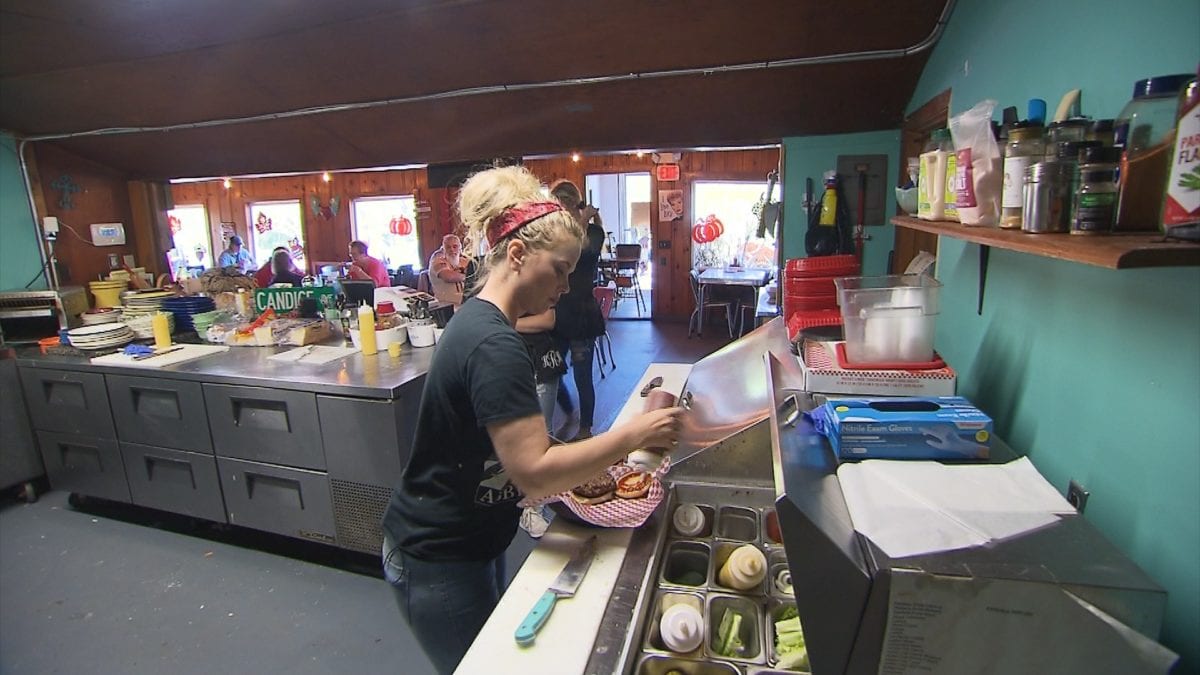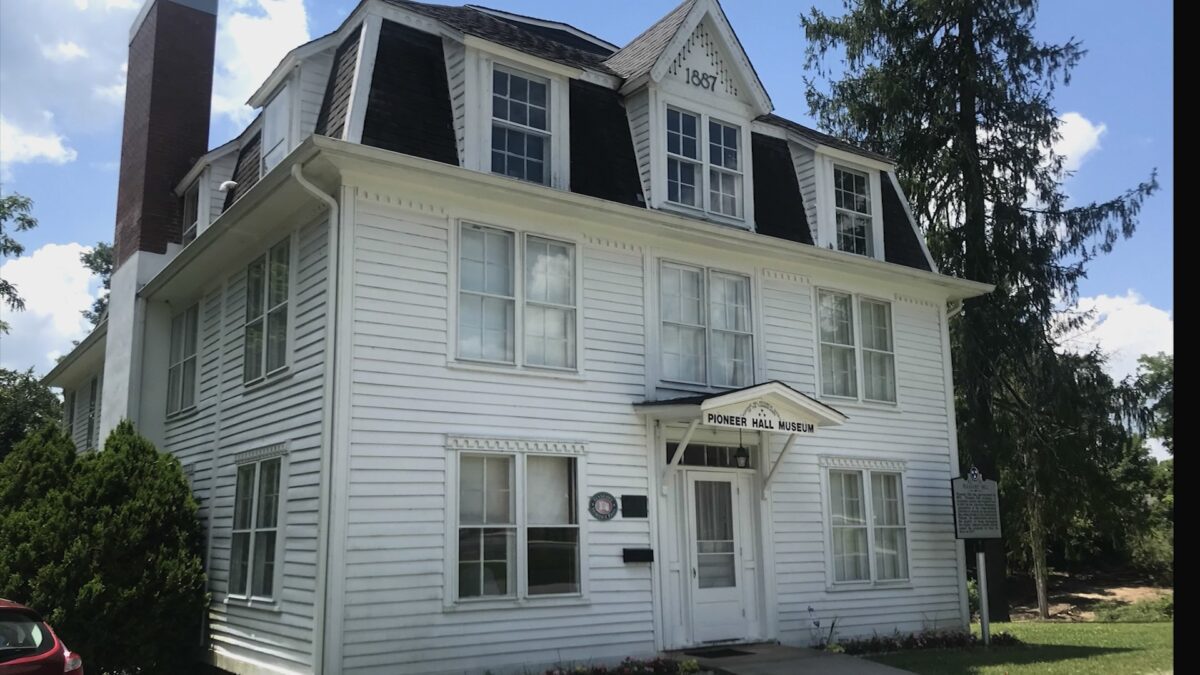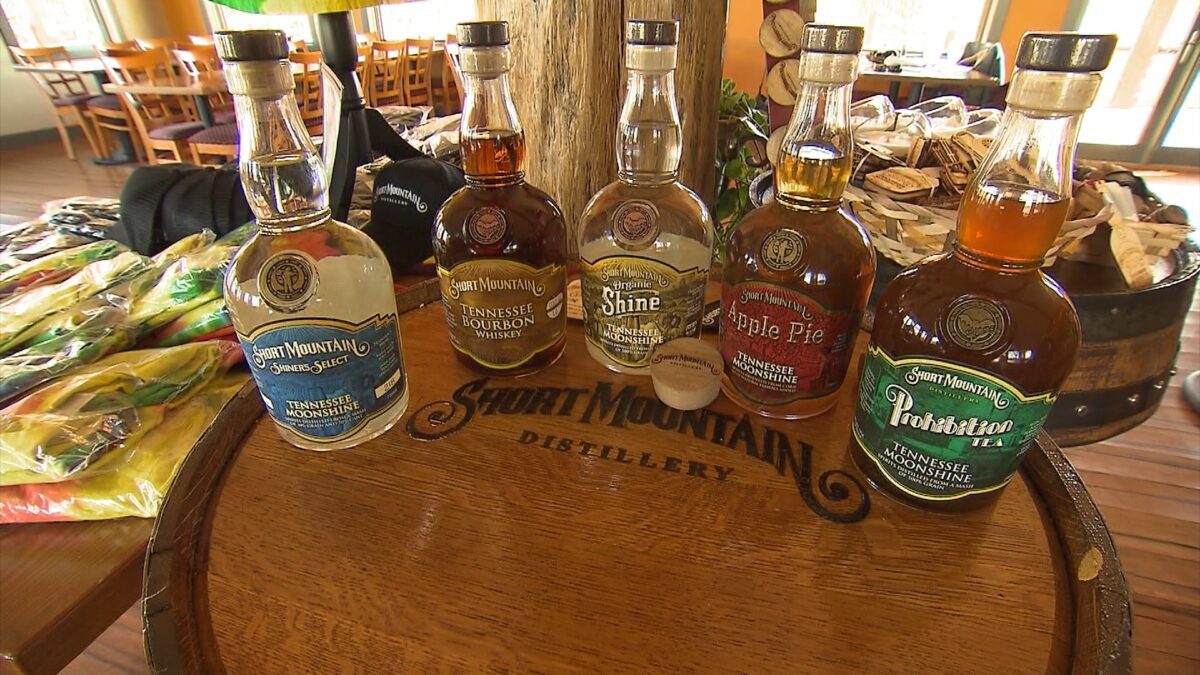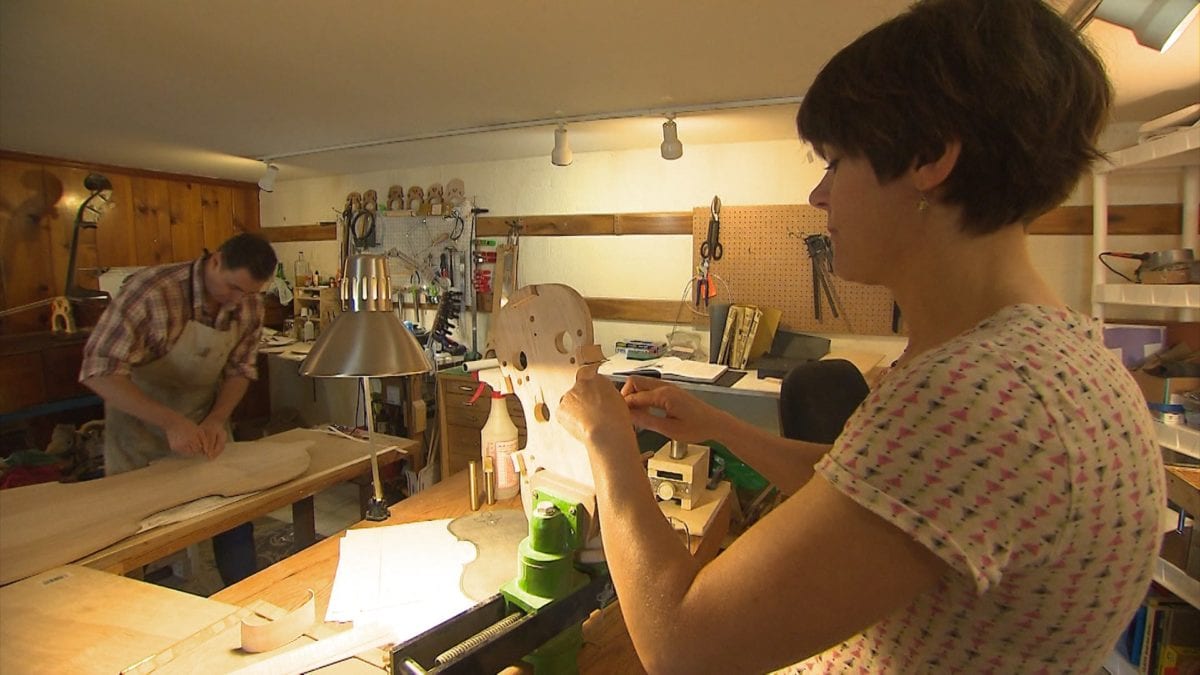- This time on Tennessee Crossroads, we explore a comfort food find near Ashland City. Then we visit an educational landmark on the Cumberland Plateau. We discover how they make whiskey over in Cannon County. And meet a pair of luthiers in music city. That's our lineup for this edition of Tennessee Crossroads. I'm Joe Elmore, thanks for joining us! Have you ever been to a place that made you feel at home the moment you got there? Well, it didn't take Rob Wilds long to feel comfortable at O'Brien's Southern Diner just outside Ashland City. Much of that at home feeling is because the owner makes certain every plate that leaves her kitchen passes a personal perfection test.
- Here we go!
- [Rob] Come to O'Brien's Southern Diner and you're gonna find Candace O'Brien Beasley going all the time.
- Did everything come out correct over here, y'all? Good, awesome.
- [Rob] On the rare occasion something is not correct
- Well, darn.
- [Rob] Candice knows who to blame. Not her son, who works in the kitchen, not her daughter, who's a waitress, not the other young women who are servers here, no. Candice would pretty much have to blame Candice.
- I love touching every plate because I know it's not gonna get messed up if I do it myself. I can't help it, you know? If somebody sends something back, I know it's my fault and I can't get mad at anybody else but myself, you know? I've always been that way, though. I just wanna touch every plate that goes out.
- [Rob] For Candice, there's a lot of pressure when every plate has to pass the perfection test. But you know what they say, if you can't take the heat, get out of the kitchen. Candice may feel the heat sometimes, but she's not going anywhere.
- I'm a little bit of a perfectionist.
- [Rob] Really?
- Just a little bit. We do everything big here, you know? Our pancakes are huge, our burgers are huge, plate lunch we give a little more than we probably should.
- [Rob] Part of the checking every plate is making sure her customers eyes are not bigger than their stomachs. So, along with each hamburger, each hungry guest gets a friendly warning.
- [Candice] We always make sure when somebody orders a double that's new that's never been here, we're like, you do realize that's a pound of meat, and nine times out of 10 they change their mind and they get the single. So, I try to get the waitress to just tell everybody, because I mean, they come in and get this massive burger, this little lady, you know, she can't eat that. And I want everybody to be pleased. I'd rather them be happy than to make that extra five bucks off of a double.
- [Rob] It's about letting her customers enjoy lots of good food and still feel good about it later. It's sorta like Candice and her customers and crew are all part of a dance, choreographed to deliver the favorites that come out of her kitchen.
- The biggest sellers are burgers. They're a half-pound burger, and our fish, which we hand batter fresh each order. We do catfish, but we do ours a little different. It's more of a Louisiana-style catfish, but everybody seems to really like it. We do breakfast, lunch, and dinner, Wednesday through Saturday, and then we do breakfast and lunch on Sunday, and we're closed every Monday and Tuesday. It's coming, it's got cheese. Here, just stay right there. I got you right now.
- [Rob] If Candice sounds a little like everybody's favorite grandma, there's a good reason.
- I basically have cooked all my life, or waited tables somewhere. I worked in the restaurant industry since I was 14 years old, but I grew up cooking with my Nanny and my grandmother. My Nanny and her husband owned Linebaugh's Restaurant that was on Broadway in Nashville for years. So, she taught me some things as I was young. You know, kinda what they cook there and things like that. And then, me and my grandmother, we cooked every day together. You know, we were always making food for somebody at church or taking it to someone.
- [Rob] So, with that sort of example to follow, every Christmas Candice and her crew feed all comers for free.
- [Candice] We'll hit all the local nursing homes, we'll hit all the shut-ins here, anybody that's just down on their luck, we'll feed them as well. On Christmas, we do about six, 700 meals. It's a lot.
- [Rob] It is a lot, running your own business.
- [Candice] I love it. I like being my own boss.
- [Rob] Which means bossing members of the family. Daughter Brooklyn Beasley says, yes, mom is a perfectionist, but that's okay.
- [Brooklyn] I love working with my parents. I think it's the best thing I've every done.
- [Rob] Is it really?
- Yes, and I'm so glad that this is my first job and it's with my parents and my brothers.
- O'Brien's Southern Diner is out in the country a bit, outside Ashland City, but it's a pretty drive. As you're driving down the road looking for O'Brien's, you may miss it because there's so many cars parked along the road you can't see the sign. You know what, I think she's gonna need a bigger sign and a bigger parking lot.
- On the weekends, people park on the road almost to the bridge some days. But we have that field over there. We just try to make it work.
- [Rob] Work it does. People come from all over, and still Candice knows her customers well enough to miss one who hasn't been around in a while.
- Thank y'all for coming in.
- There's one of your old bus boys.
- I know, right? How are you?
- Good, how you doing?
- I haven't seen you in forever. Forever and ever.
- [Rob] Knowing who's coming and going could be part of being a perfectionist, a perfectionist with a passion.
- We try to give back to our community as much as possible. We try really hard, we work really hard to please everyone, so we love our little shack out here.
- [Rob] Well, if you like good food and friendly folks, I'd say the chances are pretty good that you're gonna love Candice's little shack, too.
- [Candice] How are y'all doing? Is everything good?
- Thanks, Rob. We take public education for granted nowadays, but that was not the case back in the 1880s. Thanks to the efforts of some northern missionaries, Pleasant Hill Academy became one of the few educational bright spots in Tennessee. Well, Ed Jones recently toured one of the school's original buildings, which is now a museum that pays tribute to life and learning on the plateau 140 years ago.
- [Ed] In the sleepy hamlet of Pleasant Hill, just across main street from the elementary school, stands Pioneer Hall, the last remnant of Pleasant Hill Academy, the first real school this area ever had.
- The American Missionary Association, after the Civil War, turned their attention to education of mountain children and American Indians. They established over 500 institutions.
- I'll take you over here. It's a boy's dorm. This is made for two, and one desk, and there's no closet because they didn't have that much clothes. There's some hangers on the back wall, and that's basically all they had was their clothes that they hung up there.
- [Ed] The only time students walk the creaky hardwood floors these days is on field trips to learn about simpler times and a once grand educational institution built by a man on a mission. Sharon Weible is curator at Pioneer Home Museum.
- The AMA sent the Reverend Benjamin Dodge, a congregational minister from New Hampshire to come to Pleasant Hill to establish a school and a church. He was known affectionately as Father Dodge. He came with his wife, Phoebe, and his daughter Emma, and they lived here for the rest of their lives. The first building that Father Dodge constructed was the academy building across the street from Pioneer Hall Museum. The second building was this building, Pioneer Hall, which opened as a dormitory in 1889. The school accepted boys and girls, and any age. And many of the students who came were older than what we might think of as grade school and high school students, but it was their chance to get an education.
- [Ed] And what an education it was. The AMA employed teachers from the finest schools across the country to share their knowledge with the children of the Cumberlands.
- [Sharon] The academy had an excellent reputation academically. Students could go from the academy to college at the University of Tennessee. They were very well-educated in the classical, traditional education, but because of the work program they also learned life-skills.
- [Ed] Those life skills not only helped to better prepare the students for the future, but they were essential to keep Pleasant Hill Academy open.
- [Al] They had a blacksmith shop, and a lot of woodworking was done, but all the stuff in here was hand-made.
- [Ed] Docent Al Dwinger walks visitors through displays of items made and sold by the students to keep the academy afloat.
- The students did everything. They worked on the academy farm, in the kitchen, in the dining room, in the garden. They rang the bell.
- [Ed] You can't have a school without a bell, but this isn't just any old bell.
- When Father Dodge came to Pleasant Hill and he depended heavily on benefactors, and one of those people was JJ Gregory, from Marble Head, Massachusetts. And Mr. Gregory purchased the Revere bell, and he sent it to the academy.
- [Ed] Revere, as in the midnight ride of Paul Revere?
- The Paul Revere bell was cast by Paul Revere and Sons in 1817.
- [Ed] In addition to the Revolutionary War hero, there's also a life-saving heroine in Pioneer Hall's past.
- Dr. May is a tremendous part of the story.
- In 1917, when Edwin Wharton was appointed principal of Pleasant Hill Academy, he moved here with his wife, and she was a physician. So, she began treating students at the academy and people in the area, and when Edwin died in 1920, Dr. May decided to stay in Pleasant Hill, and she and her friend Elizabeth Fletcher opened the first hospital here.
- Dr. May was way ahead of her time in treating tuberculosis and one of the main thing she did she went, she set up clinics all around in the area and traveled and she made house calls all the time. Wherever she was needed, she went.
- [Sharon] She was very influential in this region. Dr. May became known as Doctor of the Cumberlands.
- [Ed] Pioneer Hal Museum holds much more than the memories of Pleasant Hill Academy. Upstairs you'll find a remarkable collection of items that made life on the plateau a little easier.
- Some of you remember an ice box. All right, here's an ice box and as I remember, you'd hang in the window this sign each week about how many pounds of ice you wanted, and then the ice man would cut the ice in his truck and bring it in and put it in the ice box, and of course it turned to water in about a week.
- [Sharon] We move into an area that we call life on the Cumberland Plateau, and that includes a kitchen and a general store, and artifacts from the farm and the home.
- [Ed] Artifacts that bring back memories for many visitors.
- I'm loving it! I'm loving it, all the antiques, the things that I see that I've used during my lifetime with my parents and grandparents. I don't want this history to be lost to our children. You need to know your history, you need to know your roots.
- I hope that visitors take away a sense of the creativity and the courage and the hard work that was needed for people to flourish here.
- Thanks a lot, Ed. Tennessee is well-known for its distilleries, established thanks to a couple guys named Jack and George. But the Cannon County distillery that you're about to visit, isn't quite a household name yet. However, as Gretchen Bates discovered, it has plenty to make a day trip worthwhile. ♪ Come and listen to my story about a man named Jed ♪ ♪ A poor mountaineer who barely kept his family fed ♪
- [Gretchen] You're probably familiar with Jed's story, which is the opposite of our story. While the Clampetts found bubbling crude and went to Californ-y, Billy Kaufman left Beverly for the hills of Tennessee. And while what he found bubbled, all right, it wasn't black gold, it was white lightning. But Billy's journey, which led to the creation of Short Mountain Distillery originally had nothing to do with drinking corn, but growing it, as our tour guide explains.
- My name is Jeff, hello, welcome. Welcome to Little Short Mountain Farm, ladies and gentlemen. When he got this place, it was all about I just want to get away. He was actually from Beverly Hills, California. Can you believe that? And wanted to settle down. If I can, I'd like to try to establish an organic farm, if he could. So he got this place and that was the aspiration.
- It took a few years, but I realized after a while that people weren't really making their money small farming. What they were really doing was making money moonshining. They've been doing it here so long everyone is related to a moonshiner, whether they like it or not. Tell them how you blew yourself up.
- Are you filming already?
- [Gretchen] Meet Ronald Lawson and Ricky Estes, Billy co-conspirators, business associates, two Cannon County natives with a vast knowledge of what Granny called tonic.
- If you want to hear stories about moonshiners trying to outrun the law or anything like that you should talk to Ricky and Ronald. Ricky has been caught, you know, a bunch of times, probably.
- I love to make moonshine. I born, my whole family was moonshine.
- And Ronald has never been caught.
- It wasn't that I outsmarted them, it was just pure luck.
- Their personalities are very different, even though, for decades, they've been making the same exact recipe.
- [Gretchen] Who makes better shine?
- I think I do, Ricky things he does.
- The way it is, you try to do the best with it.
- Ronald was the first person to introduce me to Tennessee moonshine.
- Good moonshine will have that good mellow corn taste, and you feel that warm feeling coming up.
- That's right.
- If you drinking moonshine and quick as you drink it just burns you up, it's not good shine.
- It was just so foreign to me, and when I tried it, I really loved it. It became my favorite spirit.
- For many years, making that spirit might have resulted in a change of address. Hey, what about my phone call? Luckily for Billy and friends, that changed a few years back.
- The Tennessee legislature deregulated hard liquor. Well, what do you think Billy thought when he heard that. Yeehaw, he was ready to do it, then.
- [Gretchen] Ready, willing, but unable to finance it on his own. So, Billy followed the example of other moonshiners and made it a family tradition.
- When we knew that it was a possibility to have a distillery in Cannon County, I called my brothers and they both decided to help me finance the distillery. My brothers and I thought it was a good idea to put our family value, the Golden Rule, on every bottle that we produce. So, if you look at one of our bottles, you can see a coin on it. On the back are the three stars of Tennessee, and the Golden Rule. And now we're making things that we made before Prohibition, like Tennessee whiskey and rye whiskey and bourbon, and all that is starting to come out now because we've just matured as a real distillery. There's no bells and whistles, it's just really good corn, organic corn if we can do it, really good rye, really good malt, and grind them fresh all here, pure spring water.
- [Gretchen] Pure water that owes its quality to the distillery's namesake.
- Short Mountain is one of the last little outcrops of the Appalachians, and it's filled with limestone and little crevices and caves, and when it rains on Short Mountain, it gets filtered down through that limestone, and all around Short Mountain there are these springs. And one of them actually used to be the spring where Cooper Melton made moonshine for Al Capone. And we use that spring to supply all of our water here at the distillery.
- After you've toured the distillery, it's just a short walk to the Still House Cafe, where you can grab a bite to eat and sample the spirits.
- [Billy] We don't just want to be like a regular distillery tour. We try and give people a lot of hands-on experiences, and one of the things that we do is we have a cocktail class. And this cocktail class is all about having a good time and learning how to make classic cocktails with our spirits. This place is not very far away from Nashville, Knoxville, Chattanooga, but it's a different world. That's what it's all about. It's really about getting out of the hustle and the bustle and coming somewhere where there's not gonna be big crowds, where you're gonna be able to walk through the woods and hear the birds and sit outside and watch the cows graze. We just encourage people to come out here and experience the place and enjoy themselves.
- Good job, Gretchen. You know, a musician is someone who plays an instrument. A luthier is someone who makes stringed instruments. Often they do both. Well, like the Nashville pair you're about to meet. Our final stop is the workshop of Jennifer Halenar and Randy Hunt. The place where they stay engrossed in a world of wood and strings. Jennifer Halenar and Randy Hunt are a couple and they make music together. Nothing strange about that. They live in Nashville, after all. But in addition to playing these ageless instruments, their passion is also building them.
- I didn't know if I was gonna enjoy making violins. It was just like I need to try this and I'll make one in see what I think. And I loved it and I still play it.
- I always thought it would be really cool to make a bass. I just thought it was such a mystery and beyond my capabilities, but once I started repairing them, setting them up and learning more about them, then I realized I can do it.
- [Joe] For Randy and Jennifer, it's a life immersed in violins and basses. And to sustain that life, they teach lessons, play a few gigs, along with repairing and restoring instruments for other musicians. However, the satisfaction of creating a timeless piece of wood and string craftwork, well that's a special rush of its own.
- When you get one completed and it's able to be heard and played, it's a great moment. I always kinda talk about it like it's a baby being born.
- [Joe] Size not withstanding, the violin and bass share the same tuning, their shapes are similar, and making either one requires detail, planning, patience, and a lot of skill.
- I've got my arching template so I know the basic share of an arch.
- [Joe] Jennifer is making a viola that started with a template from a finished instrument.
- This has the double purfling with the fleur de lis, and I'll do that in the viola. And then on the other side, it's really not very pretty. You see that I had to use a plastic sign from Home Depot to make this. Whatever gets you by.
- [Joe] It takes just the right amount of heat to shape the thin strips of wood, usually maple, and getting each piece perfect is a gradual process at best.
- A little more! Try to think really positively and put good juju into it when I'm making it. I talk sweetly to them. I don't like having negative energy around the instrument. I just don't want to put that into it, so I try to think positive thoughts.
- [Joe] For strength, Randy is installing a spruce bar on the inside of his base using a centuries-old method.
- It helps provide structural support and then also helps spread the vibrations along the length of the base.
- [Joe] On each side of that bass bar, Randy will install a sound post.
- And that transfers the sound from the back to the top. And this is very crucial to the sound. Any movement back and forth can effect the tone, and that's how you can adjust the tone of the instrument. Just about to the point where this is gonna come out. You trim these blocks down, just like with the violin, shape them, take off some extra weight. A lot of people like to put the tops on first because you're gonna cut the mortis for the neck and it's easier to do that when the back's not off, 'cause you can go all the way through.
- [Joe] Meanwhile, Jennifer's ready to work on the top wood of her viola.
- You go around with a washer that gives you your edge distance, about two and a half millimeters. And you go around and you draw it, and then you have more of the shape of a real instrument. Fill out your corners the way you want those to look, and then you go take it to the ban saw and cut it out.
- [Joe] So, what's it like being a music-minded couple working together day in and day out?
- It's very helpful to be in relationship with someone who's also a luthier. He understands, you know, the amount of time it takes, the patience that it takes.
- Oh it's great! I mean, she's a constant source of inspiration for me. So, watching here, that's helped me really keep on track with making my bass and she's taught me a lot.
- [Joe] And of course, there are occasional music breaks. Sometimes with a little levity thrown in.
- Don't go in the water!
- [Joe] Jennifer and Randy share the same passion of playing, restoring, and building instruments of fine music. And together, well, they seem to enjoy a rare harmony in life, as well as in song.
- Well, it's about time for our closing music. Meanwhile, I hope you'll join us on our website, tennesseecrossroads.org, follow us on Facebook, of course, and we'll see you next week.




